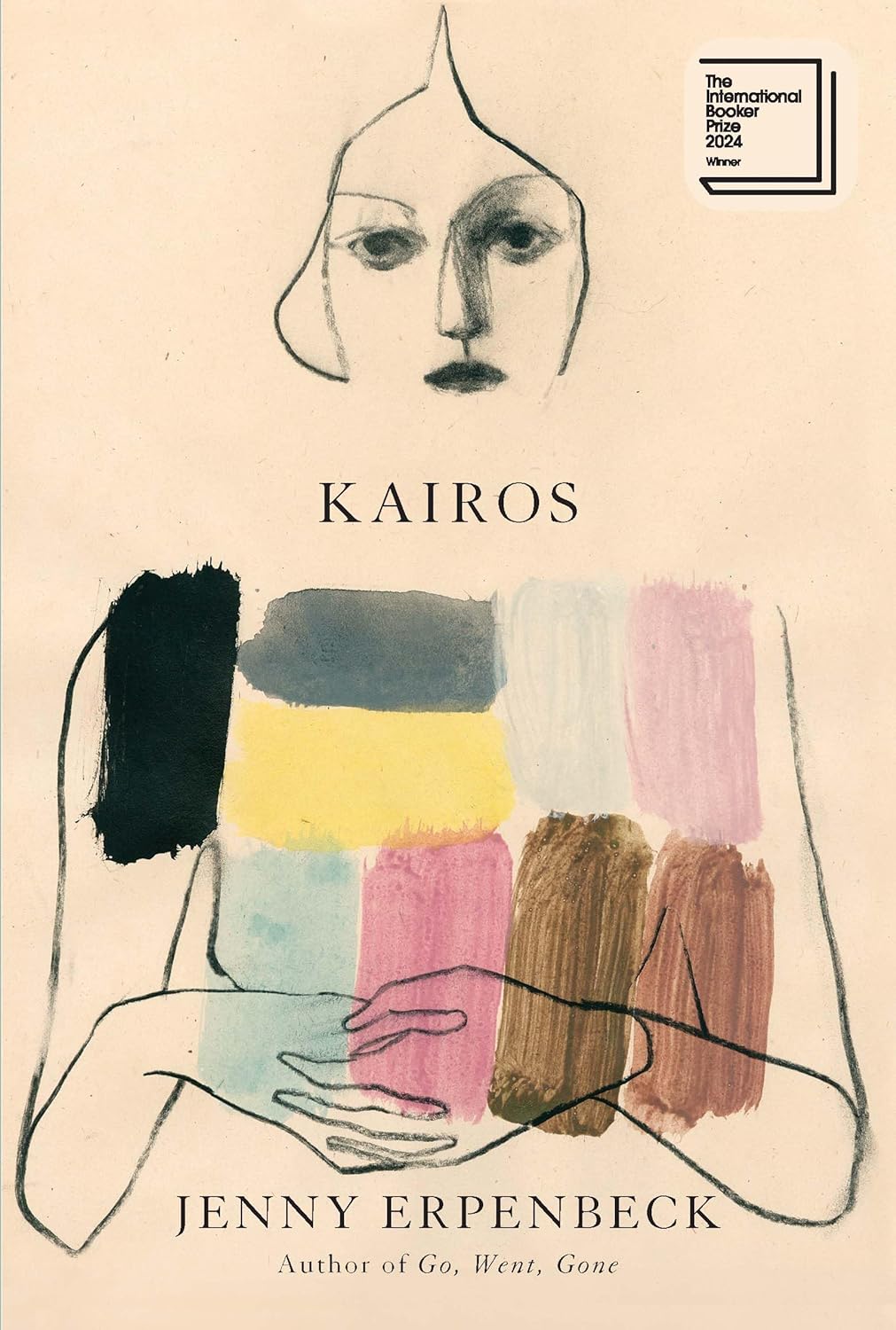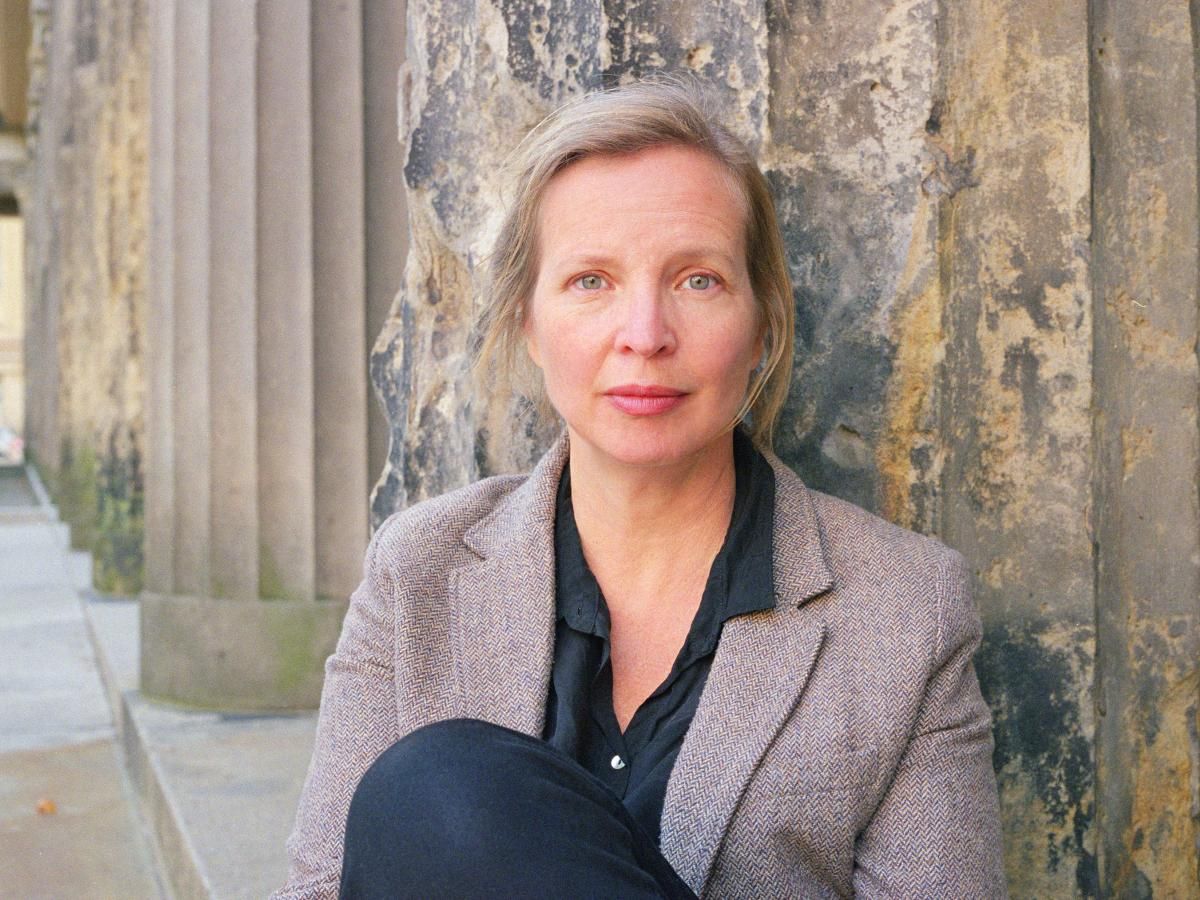Jenny Erpenbeck (Author), Michael Hofmann (Translator)
Kairos: A Novel - Winner of the International Booker Prize 2024
Kairos: A Novel - Winner of the International Booker Prize 2024
Couldn't load pickup availability
Share
Kairos by Jenny Erpenbeck, translated by Michael Hofmann, wins the International Booker Prize 2024

Jenny Erpenbeck’s much anticipated new novel Kairos is a complicated love story set amidst swirling, cataclysmic events as the GDR collapses and an old world evaporates
Jenny Erpenbeck (the author of Go, Went, Gone and Visitation) is an epic storyteller and arguably the most powerful voice in contemporary German literature. Erpenbeck’s new novel Kairos―an unforgettably compelling masterpiece―tells the story of the romance begun in East Berlin at the end of the 1980s when nineteen-year-old Katharina meets by chance a married writer in his fifties named Hans. Their passionate yet difficult long-running affair takes place against the background of the declining GDR, through the upheavals wrought by its dissolution in 1989 and then what comes after. In her unmistakable style and with enormous sweep, Erpenbeck describes the path of two lovers, as Katharina grows up and tries to come to terms with a not always ideal romance, even as a whole world with its own ideology disappears. As the Times Literary Supplement writes: “The weight of history, the particular experiences of East and West, and the ways in which cultural and subjective memory shape individual identity has always been present in Erpenbeck’s work. She knows that no one is all bad, no state all rotten, and she masterfully captures the existential bewilderment of this period between states and ideologies.”
In the opinion of her superbly gifted translator Michael Hofmann, Kairos is the great post-Unification novel. And, as The New Republic has commented on his work as a translator: “Hofmann’s translation is invaluable―it achieves what translations are supposedly unable to do: it is at once ‘loyal’ and ‘beautiful.’”


Editorial Reviews
Prologue
Will you come to my funeral?
She looks down at her coffee cup in front of her and says nothing.
Will you come to my funeral, he says again.
Why funeral— you’re alive, she says.
He asks her a third time: Will you come to my funeral?
Sure, she says, I’ll come to your funeral.
I’ve got a plot with a birch tree next to it.
Nice for you, she says.
Four months later, she’s in Pittsburgh when she gets news of his death.
It’s her birthday, but before she gets any congratulatory calls from Europe, she gets his son Ludwig on the phone, saying: Dad died today.
On her birthday.
The day of his funeral, she’s still in Pittsburgh.
At five in the morning, ten o’clock in Berlin, she gets up in time for the beginning of the ceremony, sets a candle on the hotel table-top, lights it, and plays music for him from YouTube.
The second movement of Mozart’s D-minor Piano Concerto, K. 466.
The aria from Bach’s Goldberg Variations.
The A-minor Chopin Mazurka.
Each piece comes with commercial interruptions.
The new Hyundai. A bank offering home loans. A cold cure.
When she returns to Berlin six weeks later, she sees the fresh sandpile next to the birch tree. The roses she got a friend to lay on the grave have already been cleared away. Her friend tells her all about the ceremony. And the music that was played.
What music was it?
Mozart, Bach, and Chopin, her friend says.
She nods.
Six months later, her husband is home by himself when a woman turns up and delivers two large cardboard boxes.
She was crying, he says, I had to give her a handkerchief.
The cardboard boxes are left standing around in Katharina’s study into the fall.
Each time the cleaning lady comes, Katharina moves them onto the sofa and once the room’s been cleaned, she puts them back on the floor. When she needs to use the library steps, she pushes them aside. She has no space on her shelves for two large cardboard boxes.
The basement flooded recently. Maybe she should just take them to the dump? She opens one of them and looks inside. Shuts it again.
Kairos, the god of fortunate moments, is supposed to have a lock of hair on his forehead, which is the only way of grasping hold of him. Because once the god has slipped past on his winged feet, the back of his head is sleek and hairless, nowhere to grab hold of. Was it a fortunate moment, then, when she, just nineteen, first met Hans? One day in early November, she sits down on the floor and prepares herself to sift— sheet by sheet, folder by folder— through the contents of the first box, then the second. It’s so much detritus. The oldest items date back to ’86, the latest are from ’92. There are letters and carbons of letters, scribbled notes, shopping lists, desk diaries, photo prints and negatives, postcards, collages, a few newspaper clippings. A sugar cube (from the Kranzler Café) disintegrates in her fingers. Pressed flower petals slip out from between pages, passport photographs stay pinned to pieces of paper, there’s a twist of hair in a matchbox.
She has a suitcase of her own, full of letters, carbons, and souvenirs, “flat product” for the most part, as the archivists like to say. Her own diaries and journals. The next day she climbs up the library steps and takes it down from the top shelf, it’s incredibly dusty in- side and out. A long time ago, the papers in his boxes and those in her suitcase were speaking to each other. Now they’re both speaking to time. A suitcase like that, cardboard boxes like that, full of middles and endings and beginnings, buried under decades’ worth of dust; pages that were written to deceive alongside other pages that were striving for truth; things itemized, other things passed over, all lying together higgledy-piggledy; the contradictions and the denials, silent fury and mute adoration together in one envelope, in one folder; what is forgotten just as creased and yellowed as what, dimly or distinctly, one still remembers. While her hands pick up dust from the old folders, Katharina remembers how her father used to make guest appearances at childhood birthdays as a magician. He would throw a whole pack of playing cards up in the air, and still manage to pick out the one that she or one of the other children had chosen.
About the Author
Jenny Erpenbeck was born in East Berlin in 1967. New Directions publishes her books The Old Child & Other Stories, The Book of Words, andVisitation, which NPR called "a story of the century as seen by the objects we've known and lost along the way."
-----------
The award-winning translator Michael Hofmann has also translated works by Jenny Erpenbeck, Gert Hofmann, Franz Kafka, Heinrich von Kleist, and Joseph Roth for New Directions.
Product details
-
Publication
New Directions
-
Author
Jenny Erpenbeck (Author), Michael Hofmann (Translator)
-
Language
English
Lexile:
-
Pages
304
-
ISBN-13
9780811238533



